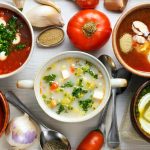The discomfort of overnight fermentation – that bloaty, gassy feeling many experience after an evening meal – is surprisingly common, often linked not just what we eat, but when and how. It’s a consequence of the natural digestive process, where gut bacteria break down food. However, certain foods accelerate this process, leading to excessive gas production during sleep. The goal isn’t to eliminate fermentation entirely (it’s essential for health!), but rather to modulate it, creating an environment that supports comfortable digestion and minimizes overnight discomfort. This means focusing on evening meals that are easier to digest and less likely to fuel rapid bacterial activity while we rest.
Many factors play a role in overnight fermentation beyond just food choices. Stress levels, sleep quality, hydration status, and individual gut microbiome composition all influence how our bodies process food. However, dietary adjustments can significantly impact the amount of gas produced during digestion. The key is understanding which foods are more prone to rapid fermentation and strategically incorporating alternatives or combining them with digestive aids in evening meals. This article explores specific soup recipes and ingredients that aim to reduce overnight fermentation, focusing on gentle digestibility and promoting a calmer gut environment for restful sleep. If you suspect deeper issues might be at play, consider reviewing signs your body isn’t digesting properly overnight.
Soothing Soup Foundations: Ingredients & Principles
The foundation of any anti-fermentation evening soup lies in the careful selection of ingredients. We want to prioritize easily digestible components while minimizing those known to trigger excessive gas production. Low FODMAP principles are incredibly useful here, although strict adherence isn’t always necessary. The focus should be on reducing overall fermentable carbohydrate intake in the evening meal. This means limiting high-fructose fruits, certain vegetables (like onions and garlic – more on that later), and large amounts of legumes. Instead, we can leverage ingredients known for their calming properties and digestibility.
Soups are naturally beneficial because of their liquid content; hydration aids digestion and helps move food through the system efficiently. The warmth of soup also promotes relaxation, which can further support healthy digestive function. Beyond that, broth-based soups are easier to digest than cream-based ones, as fats take longer to break down. Lean proteins are preferable to fatty meats, and incorporating herbs known for their carminative properties (like ginger or fennel) can actively help reduce gas production. The gentle cooking process inherent in soup making also pre-digests some foods, making them easier on the stomach overnight. To further support a calm digestive system, consider evening habits that can help quiet a hyperactive gut.
A crucial element often overlooked is food combining. Combining certain foods can either enhance or hinder digestion. For example, pairing starchy carbohydrates with large amounts of protein can slow down digestion and promote fermentation. Evening soups should aim for simpler combinations – a lean protein source with easily digestible vegetables and a light broth. Consider the order in which ingredients are added to the soup; starting with slower-digesting components (like root vegetables) and adding faster-digesting ones later can help optimize the process. Understanding how foods calm the stomach can also influence your choices here.
Building Your Anti-Fermentation Soup: Recipe Ideas
Let’s move beyond theory and explore some practical recipe ideas. A classic example is a Chicken & Ginger Broth with Zucchini Noodles. This soup uses lean chicken breast, which is easy to digest, paired with zucchini noodles instead of heavier pasta or potatoes. The ginger provides carminative benefits, and the broth base keeps it light and hydrating. Another excellent option is a Carrot & Turmeric Soup – carrots are well-tolerated by many, and turmeric possesses anti-inflammatory properties that can support gut health.
A creamy (but not too creamy) soup variation could be a Butternut Squash & Coconut Milk Soup, using a small amount of full-fat coconut milk for richness without overwhelming the digestive system. Butternut squash is relatively low FODMAP and provides essential vitamins. Avoiding excessive amounts of spices beyond turmeric and ginger is also important – while flavorful, some spices can irritate sensitive stomachs. Remember to use homemade broth whenever possible, as store-bought broths often contain additives that can contribute to fermentation. The focus should always be on simplicity and gentle digestibility. Dietary choices are especially important if you experience symptoms of GERD.
Minimizing Common Fermentation Triggers
Many common soup ingredients are notorious for causing gas and bloating. Onions and garlic, while flavorful, are high in fructans – a type of FODMAP that ferments rapidly in the gut. If you’re particularly sensitive, consider omitting them entirely or using asafetida (hing) as a substitute; it offers a similar savory flavor without the same digestive consequences. Similarly, beans and lentils, though nutritious, should be limited in evening meals due to their high fiber content and potential for gas production. If you do include legumes, soaking them thoroughly overnight and cooking them with kombu seaweed can help reduce their fermentability.
Cruciferous vegetables (broccoli, cauliflower, cabbage) are also known to cause bloating. While healthy, they contain raffinose – another FODMAP that requires bacterial fermentation to break down. Steaming or sautéing these vegetables before adding them to soup can make them more digestible. Consider using smaller portions and pairing them with carminative herbs like fennel or dill. Finally, dairy products can be problematic for some individuals. If you’re lactose intolerant or sensitive to dairy, opt for plant-based alternatives or use small amounts of well-tolerated fermented dairy (like yogurt) in your soup. Be aware of foods that inflame the lower esophageal sphincter, and avoid them if you’re prone to heartburn.
The Role of Herbs & Spices
Beyond ginger and turmeric, several other herbs and spices can actively support digestion and reduce fermentation. Fennel seeds are known carminatives that help relax the digestive tract and prevent gas buildup. Adding a pinch of fennel seed to your soup during cooking or chewing on a few seeds after eating can be incredibly beneficial. Similarly, chamomile possesses calming properties that can soothe the gut and promote relaxation. A small amount of chamomile tea sipped alongside your soup can further enhance its benefits.
Peppermint is another excellent choice; it helps relax the muscles in the digestive tract, reducing cramping and bloating. However, peppermint should be avoided by individuals with GERD (gastroesophageal reflux disease) as it can worsen symptoms. Cumin is often overlooked but possesses powerful anti-inflammatory properties that can support gut health. A small amount of cumin added to your soup provides both flavor and digestive benefits. Remember, moderation is key; excessive amounts of any spice can potentially irritate the stomach. Be mindful of household items that might also contribute to throat irritation.
Broth Selection & Preparation
The broth you choose forms the very foundation of your anti-fermentation soup, so selecting the right one is critical. Homemade bone broth is ideal – it’s rich in collagen and amino acids that support gut healing and digestion. However, if homemade isn’t feasible, opt for a high-quality store-bought broth with minimal additives. Avoid broths containing MSG, artificial flavors, or excessive sodium. Checking the ingredient list carefully is essential.
Vegetable broth can also be used, but ensure it’s made from low FODMAP vegetables to avoid triggering fermentation. When making your own broth, consider using a combination of chicken (or fish) bones and aromatic vegetables like carrots, celery, and parsley. Simmering the ingredients for an extended period – ideally 8-12 hours for bone broth – extracts maximum nutrients and flavor. Strain the broth thoroughly to remove any solids before adding other ingredients to your soup. Finally, avoid using bouillon cubes or concentrated broth bases, as they often contain undesirable additives that can contribute to digestive discomfort.


















